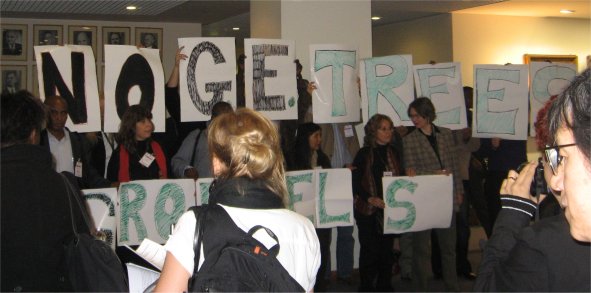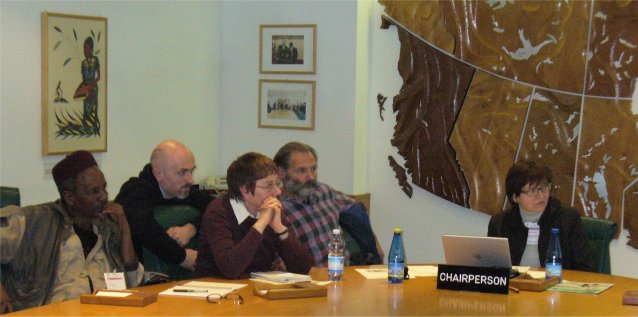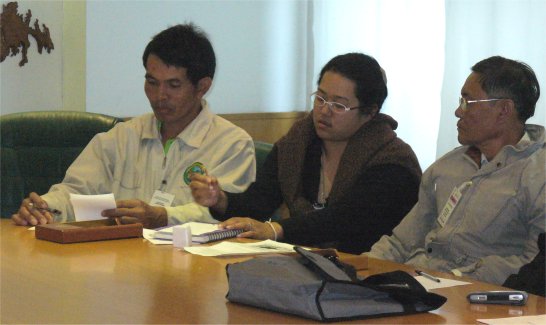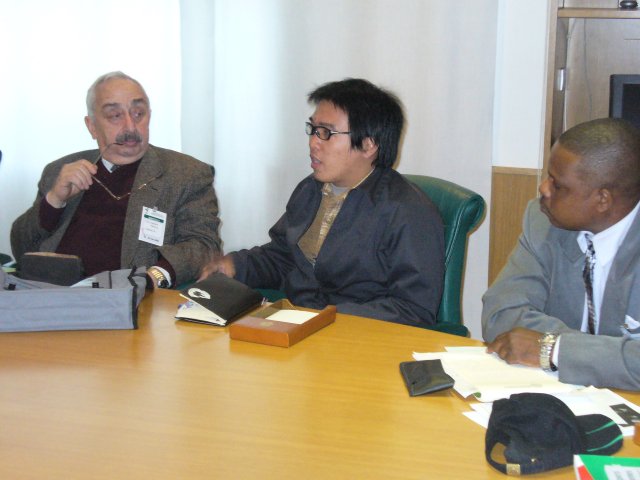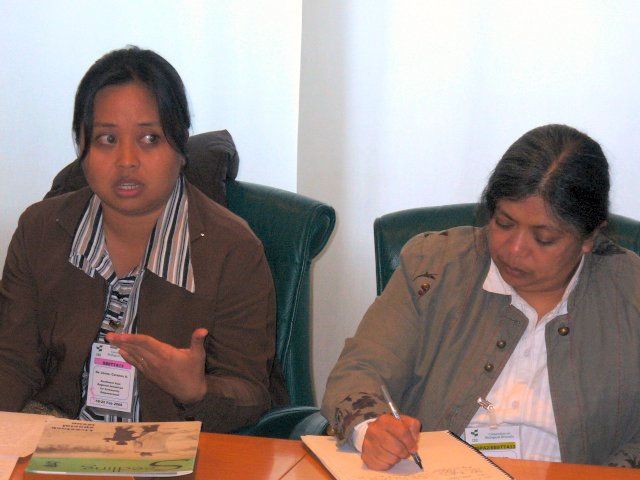|
CBD / SBSTTA 13
|
|||||||||||||||||||||
|
13th meeting of the Subsidiary Body on Technical and Technological Advice held in Rome, 18 -22 February 2008 |
SBSTTA Recommendations on Agricultural Biodiversity Brief review of the Agricultural Biodiversity negotiations at CBD / SBSTTA 13 by Patrick Mulvany, Practical Action 28 Feb 2008 Refs: ECO 5 article “The Decline and Fall of the Roman SBSTTA” www.ukabc.org/sbbsta13_declineandfall.pdf and ENB's summary report www.iisd.ca/download/pdf/enb09427e.pdf .
These negotiations could have been visionary. They could have proposed a ‘paradigm shift', as called for by FAO, towards biological intensification of agricultural systems and away from chemically-dependent production of food. They did not. Small mercies that the Recommendation still retains some reference to sustaining ecosystem functions related to agricultural biodiversity that are so essential for securing future food supplies.
COP 9 will have a lot of work to do, not only ‘unbracketing' precautionary text on biofuels, climate change and perverse incentives. Parties will also need to insert new language that takes the programme of work forward to address the challenges of conservation, sustainable use and development of agricultural biodiversity, especially on-farm, where it can adapt to new challenges, such as climate change – both mitigation and adaptation. COP 9 has much to build on, not least the landmark Decision III/11 and its Annex 1, see www.ukabc.org/cop9agbiodagenda.pdf , and Decision V/5, with its programme of work and agreement, reconfirmed by COP 8, to a moratorium on the field testing and commercialisation of Terminator technology. Also the multiple efforts of countries and organisations and especially food providers themselves, emphasised by Indigenous Peoples and Via Campesina at SBSTTA 13, about their work on agricultural biodiversity and the constraints to their inalienable rights to use, develop, exchange and benefit from this.
It also has some text, that although somewhat buried could be given the oxygen of exposure as priority issues in the COP Decision. In the BOX below extracted from the 7 pages of text of the Recommendation are 8 points are of interest that could be strengthened. None is particularly new, they are issues that have been discussed before. But each illustrates a key area for future work of the CBD if it is to achieve its mandate and sustain Life on Earth.
There is much left to do between now and COP 9. The good text must be defended and strengthened and preparations must be made to ensure rejection of any negative text, that is not in the Recommendation at present but might be introduced e.g. on the transfer of ‘new technologies' (i.e. biotechnology) or ‘genetic modification' or ‘Terminator/ GURTS' etc.
The major debates at COP 9 will centre on the bracketed text on agrofuels, climate change mitigation and perverse incentives. But on the latter, more should be done, to make clearer the ultimately self-defeating and biodiversity-reducing effects of supporting chemically-based intensive industrial food production systems and to Decide, not only to call for the removal of perverse incentives but to recommend increased incentives and support for biodiversity-enhancing agriculture, controlled by small-scale food providers.
Let us hope Parties take up the challenge to make this Decision ‘visionary' and competent to face up to the challenges of the 21 st century. And that on Agrofuels, in particular, the potential Bonnfire of Biodiversity can be prevented by COP 9.
To repeat the exhortation from the article in ECO 1 @ SBSTTA 13: “The Parties to the CBD need to seize this historic moment and: • Put culture back into agriculture • Put biology back into biodiversity • Put food sovereignty, food providers and their social organisations at the centre of agricultural biodiversity policy and practice “ Ref: ECO 21-1 ‘Food Providers hold the Key – the CBD has the Mechanism' www.ukabc.org/foodprovidersholdkey.pdf
The full text of the Decision contains references to most of the ongoing work on agricultural biodiversity but is weak. It does not call for the 'paradigm shift' towards biologically-based intensification of agriculture and away from chemically-dependent production that is necessary. Small mercies that the Recommendation still retains some reference to sustaining ecosystem functions related to agricultural biodiversity that are so essential for securing future food supplies. (But even this small reference was under threat from Australia, late in the night... ). In the 'highlighted' document accessible through the link below, key points relating to the role and inclusion of food providers in the conservation and use of agricultural biodiversity, the importance of ecosystem functions and other key points are highlighted in yellow. A short report summarising these points will be published here in a day or two.
No GE Trees - CSOs demonstrate at SBSTTA13
40 CSOs demonstrated peacefully outside the Plenary Hall in FAO at 10:00am Thursday morning, calling on SBSTTA to ban GE Trees. They made two interventions. One calling for the ban and alerting SBSTTA to the petition, now signed by more than 130 CSOs and social movements worldwide (see: www.globaljusticeecology.org/stopgetrees.php?ID=99). The other to warn SBSTTA that CSOs are monitoring who speaks, for how long and how usefully - to try and moderate the filibustering that is being used by a few delegations to time-out the negotiations and stop meaningful disucssion on these life threatening issues. Late night negotiations on Agricultural Biodiversity weaken text Delegates spent the afternoon and well into the early hours of the morning deleting substance and weakening text on the Agricultural Biodiversity recommendation. Just a few (wealthy) countries dominated the session and the voices of the majority were absent. A new negotiating text will be available Thursday lunchtime. The final fling was to delete what COP 8 had called for: the 'Vision and Mission' for the CBD's work on agricultural biodiversity. Without 'Vision', delegates left as the moon entered a total eclipse in the night sky...
Side Event: Agricultural Biodiversity for Food Sovereignty
From left to right: Bouréima Dodo, Riccardo Bocci & Rachel Berger (interpreters), Guy Kastler, Susanne Gura (chair) Guy Kastler from Via Campesina, Bouréima Dodo from ROPPA, Chau Duong from VietNam and Wan UrangTu from Thailand addressed nearly 40 people in a lively side event in the Canada Room, FAO at Tuesday lunchtime. It was titled Agricultural Biodiversity for Food Sovereignty. They called for a paradigm change in agriculture and livestock raising to diverse, agroecological systems that are managed by small-scale producers, which can adapt to changes in climate. They also demanded public research that would meet future needs, especially at this time of global warming, rather than research for paradigm maintenance. They called on the CBD to promote agroecology in their Decision on agricultural biodiversity, to recognize their rights and to include them in decision making and actions. Guy Kastler from Via Campesina expanded on the intervention he presented to SBSTTA (see below). Presentation by Bouréima Dodo, Executive Secretary of AREN, the livestock keepers organisation of Niger , which is a member of the small farmers platform (PFP) of Niger , a consultative organisation for more than 26 peasant organisations in Niger . The PFP of Niger is a founder member of the network of agricultural producers of West Africa (ROPPA). (English) (français)
From right to left: Chau Duong (CBDC VietNam), Phimonphan Sakitram, Wan UrangTu (CBDC Thailand)
From left to right: Tengiz Urushade(Georgia), Chrisgel Ryan A Cruz (Philippines), Serge Benstrong (IFAP)
From left to right: Che de Jesus (SEARICE, Philippines), Joji Cariño (Tebtebba) Presentation by Bouréima Dodo (ROPPA) The CBD which is seeking to bring sustainable responses in the face of current challenges, notably climate change and the deterioration of livelihoods of men and women around the world is a praiseworthy initiative. Farmers organisations like ROPPA can only welcome that agriculture is being put at the heart of major issues. However, the Convention should really make a distinction between the types of agricultural production according to their impacts on the environment, biodiversity, and the deterioration in the means of subsistence for humanity, in order to take account of the priority to give to types of production that place a value on biological diversity. We have heard how agriculture is destroying biodiversity, and is one of the biggest causes of environmental degradation. But it is industrial agriculture that is causing the problems.
On this point, the contribution of family farming is pertinent to our current preoccupations. How can one ignore the expertise of pastoralists in the Sahel for example, who are already living in fragile ecosystems and who have developed ways of conserving biological diversity through a highly developed knowledge of the dynamic complexity of different vegetation, and strategies for using natural resources, forecasting and management of frequent crises [like droughts], putting to effective use large [pastoral] ranges. Thanks to this type of extensive livestock management, the environment is enriched: • browsing of trees for precisely defined periods strengthens the plants and without this management, they would deteriorate • grazing leads to regeneration of seeds and seed dispersal of pasture and tree species • Mobility allows for regulation of the range's grazing capacity • The herd mix (cows, sheep and goats) enables rational exploitation of scarce resources. The policies for sedentarisation have dealt a harsh blow to the environment, leading to accelerated degradation of settlement sites and competition and pressure on natural resources which lead often to damaging conflicts. Imports of industrial milk and meat products has dealt a fatal blow to the local economy. The persistent promotion of industry contributes without doubt to the disappearance of species particular to the Sahel , for the sole reason that they are not ‘productive'. It is about the disappearance of a whole society, replaced by a culture that in no way enriches humanity. For all these reasons, farmers' organisations demand that agricultural policies must be built upon food sovereignty in a context where the demand for justice and equity is strongly felt among all men and women in the world. It is an alternative to the damaging impacts of industrial exploitation which is contributing to global impoverishment in social and economic terms, and contributes significantly to global warming. On another point, the true guardians of agricultural biodiversity should benefit from the advantages of using biological diversity and they should be protected against the expropriation of their rights. Finally, for us, the interest in agrofuels remains another renewed strategy to lock developing countries into a market economy over which they have no control and it is not clear that the negative impacts on biodiversity of agrofuels will be controlled. To end, we demand that the requirement to involve farmers organisations in the process of developing agricultural policies be strengthened, because they constitute the best channel for dissemination of local knowledge into local, national, regional and international policies. --------------------------------------------------------------------------------------- Presentation par Bouréima Dodo (ROPPA) La convention sur la diversité biologique qui tente d'apporter des réponses durables au défies actuels notamment de changements climatiques et la détérioration des conditions de vide d'hommes et de femmes de part le monde, constitue une initiative louable. En plaçant l'agriculture au centre des préoccupations majeures, les organisations paysannes come le ROPPA, ne peuvent que s'en féliciter. Cependant, la convention se doit de faire sortir une appréciation différenciée des types de production agricole quant a leur impacts sure l'environnement, la biodiversité et la détérioration des moyens de subsistance de l'humanité pour tenir compte de la priorité a accorder aux types de production valorisant la diversité biologique. A cet effet l'apport valorisant de l'exploitation familiale par rapport a nos préoccupation actuelles sont pertinente. En effet, comment ignorer l'expertise des pasteures du Sahel par exemple, que vivant déjà dans des écosystèmes fragiles, ont su préserver la diversité biologique par une connaissance hautement rationnelle de la complexité de la dynamique végétales, des stratégies d'e exploitation des ressources naturelles, de prévention et de gestion de crises fréquents de ces contextes, mettant ainsi en valeur des grands espaces. Ainsi grâce a ce type d'élevage, l'environnement s'enrichit : • Le broutage d'arbres selon les périodes précises renforce les plantes et sans lequel les arbres se retreignissent ?? • Par l'ensemencement et la dispersion des semences herbiers et d'arbres • La mobilité permet de réguler la capacité de charge • Le mixage de troupeau permet une exploitation rationnelle de ces ressources rares Les politiques de sédentarisation entreprises ont apporté un coup dur a l'environnement par une dégradation accéléré des sites de stabilisation et une concurrence et une pression sure les ressources naturelles entrainant souvent des conflits meurtriers. L'importation des produits laitiers et de viande industriels ont porte un coup fatale a ces économies familiales. La persistance de promouvoir l'industrie contribue a n'en point douter, la disparition de tous les espèces élevés au Sahel, au seul fait qu'elles ne sont pas productives. Il s'agit en fait de la disparition de toute une société et une culture qui n'enrichit en aucun cas l'humanité. Pour toutes ces raisons, les organisations paysannes demandent que les politiques agricoles se doivent de se construire autour la souveraineté alimentaire dans un contexte ou le demande de justice et d'équité est un sentiment fort chez toutes les femmes et les hommes du monde. C'est une alternative contre les méfaits de l'exploitation industrielle qu'appauvrit socialement et économiquement le monde et contribue pour une large part au réchauffement de la Terre. D'autre part les gardiens véritables de la biodiversité agricole doivent bénéficier des avantages de l'utilisation de la diversité biologique agricole et être protégés contre les exploitation de leur droits. Enfin, pour nous, l'intérêt porte a l'agro-combustibles demeure encore une stratégie rénovée d'enserrer les pays en développement dans une économie de marche dont ils n'ont pas le contrôle et il ne semble pas encore certain de maitriser leur impacts négatifs sur la biodiversité. Pour finir, nous demandons que l'implication des organisations paysannes dans les processus, d'élaboration des politiques agricoles soit renforcée car elles constituent le meilleur canal de transmission de connaissance paysanne dans les instances politiques locale, national, régionale et internationale. The programme for the side event: Tuesday/Mardi 19 Feb/fev. 13:15 Canada Room A 356/7 Agricultural Biodiversity for Food Sovereignty La biodiversité agricole pour la souveraineté alimentaire Programme Via Campesina , the global farmers' movement: ROPPA (Réseau d'organisations de paysans et producteurs agricoles de l'Afrique de l'Ouest/ West African network of peasants and producers): Reflections by civil society organisations Chair/président: Susanne Gura, Germany/Allemagne 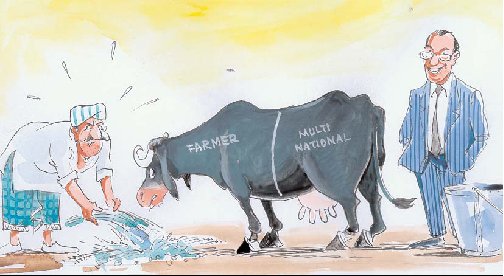 Source: Punjab Lok Sujag (2003): The political economy of milk in Punjab , Pakistan . Organized by Practical Action on behalf of the CBD Alliance and IPC for Food Sovereignty
Intervention by Via Campesina on Agricultural Biodiversity
Via Campesina – CBD SBSTTA 13 Via Campesina, the global movement of small-scale farmers in five continents, ROPPA, which represents the farmers and pastoralists of West Africa, and various civil society organisations here present are waiting for the CBD to indicate through which process it will recognise the rights of farmers, livestock keepers, fisherfolk, indigenous people and civil society NGOs to participate in decision making on the future of agricultural biodiversity. Peasant farmers do not just conserve agricultural biodiversity, they renew and add to it continuously. The collective knowledge that they use is not only traditional but, with modern agro-ecology, they continuously innovate in order to ensure sustainable use of natural ecosystems and to protect food sovereignty. They contribute to the struggle against global warming by fixing organic matter in soils. Industrial agriculture aggravates climate change by destroying soils and water resources and in consuming large quantities of fossil fuel energy in chemical fertilisers, pesticides, mechanisation and international transport. Ever since industry imposed its seeds and new livestock breeds, nowadays genetically modified or cloned, the decline of agricultural biodiversity has not stopped. In order to defray their investment in patents, industry is commercialising as few varieties and species as possible. Research into developing sterile seeds directly threatens biodiversity and peasants' livelihoods and must continue to be prohibited. In order to enable adaptation to climate change and to meet new demands for food, farmers must secure access to their traditional seeds that are locked in gene banks, and reclaim their collective rights to conserve, use, exchange and sell their farm-saved seeds and their breeding animals. Only diverse local breeds and family-based livestock keeping can respond both to the threat of avian flu and other livestock diseases, and to the need of poor people for protein. Industrial livestock production using a few patented breeds bred for excessive growth is contrary to the principles of responsibility concerning the prevention of new viruses and the hunger of poor people. Only locally selected varieties and breeds and agriculture for local markets can combat the risk of invasive exotic species. The collective rights of peasant farmers to access land for food must be defended against its appropriation for profit. With industrial production of genetically modified feed for livestock in rich countries, or of agrofuels for their vehicles, industrial tree plantations constitute the principal threat against forest biodiversity. Rich countries must renounce their illegitimate demands for debt repayment from poor countries, which forces them to destroy forests and their food crops in favour of industrial export crops. Finally, marine biodiversity and artisanal fishing on a small scale must be protected from destruction by industrial fisheries in all the world's seas, and not only in limited protected areas. Small scale farmers and livestock keepers who practice agro-ecology, as well as small-scale fisherfolk and forest peoples, are key to the protection of agricultural biodiversity and ecosystems. We demand that the CBD decisively recognises their central role. Thank you for your attention
Guy Kastler Rome , 19.02.2008
Food Providers Hold the Key - CBD has the Mechanism Comment on the CBD Agricultural Biodiversity Programme of Work After 12 years of debate, it is high time to put biodiversity-based agriculture at the heart of the CBD; adaptation through local management of agricultural biodiversity by food providers is essential for food sovereignty and planetary health in a warming world The challenge for the CBD is that without radical transformation of the dominant model of industrial agriculture, livestock production and fisheries, not only will food providers and agricultural biodiversity continue to disappear but hunger will increase as will global warming. To forestall this, among other things, the CBD needs to decisively involve the social organisations of food providers in its work.
The food insecurity created by vulnerable, uniform and genetically weak monocultures and cloned livestock and fish of the industrial model will stalk future generations. What is needed in an unpredictable world is more not less diversity, collective not monopoly control of resources, localised not global food systems – systems that conserve rather than consume carbon.
The CBD will fail in its mission if it does not confront the tsunami of corporate control of the food system from seed to sewer. In place of this it must assert the primacy of agricultural biodiversity controlled by local people over economics controlled by unaccountable TNCs.
The CBD needs to stem the tide of corporate control of food and nature when revising its Programme of Work on Agricultural Biodiversity – opening the space in international and national policy as well as for local actions that will sustain agricultural biodiversity for livelihoods, living landscapes and the production of healthy local food.
The key to these local actions is held by small-scale family and peasant farmers, pastoralists, artisanal fisherfolk, Indigenous Peoples, forest dwellers and other food providers who know how to develop and manage a broad diversity of species, varieties and breeds – our agricultural biodiversity that underpins food sovereignty and resilient production systems in the face of multiple threats.
Agricultural biodiversity is more than colourful seeds, vegetables and fruits displayed in biodiversity boutiques. It is the product of the ingenuity of women and men whose knowledge and skills over millennia have crafted myriad varieties and breeds adapted to a multitude of ecosystems and suited to every social, cultural and economic need. It is the diversity of all species above and below the ground and in aquatic systems that have co-evolved with people to provide food, fodder, natural fibre and thriving ecosystem functions that sustain life on Earth.
However, there is a haemorrhage of these vital resources accelerated by the spread of the dominant model of industrial agriculture for commodities and agrofuels, intensive livestock production and extractive fisheries, contaminating those resources that remain with proprietary GMOs. These losses are exacerbated by inequitable trade and commercial agreements, seed laws and intellectual property rights systems that undermine farmers', livestock keepers' and indigenous peoples' rights.
A countervailing policy framework exists that will defend agricultural biodiversity: food sovereignty. This is the policy proposal of small-scale farmers who know how to provide good, wholesome food. It puts them and other food providers centre-stage in the food system and prioritises the needs of consumers for nutritious foods, sourced as locally as possible. The core principles of food sovereignty cover all dimensions of a food system that will provide food in the long-term rather than short-term profits. It f ocuses on food for people rather than internationally tradeable commodities. It values food providers rather than eliminating them. It localises food systems rather than dependence on inequitable global trade. It puts control locally instead of by unaccountable corporations. It builds knowledge and skills that conserve and develop local food production and rejects alien technologies such as GMOs. It works with nature in diverse agroecological systems rather than energy-intensive production methods which damage the environment and contribute to global warming.
What is required of the Parties to the CBD is to put biodiversity-based agriculture at its core. The Parties should call for regulation of industrial food systems that destroy this biodiversity. They should also increase priority for the conservation and development of agricultural biodiversity, and the enhancement of ecosystem functions, in agroecological systems managed by food providers where they live – on-farm by small-scale farmers, on the range by pastoralists, in inland and coastal waters by artisanal fisherfolk… …and policies and practices are needed that will facilitate an increase in exchanges of GM-free seeds, livestock breeds and other genetic resources for food and agriculture, between communities, countries and continents. For example, more exchanges of diverse seeds between farmers in warmer areas to those in cooler areas, between those in wetter areas to others in drier areas and vice versa.
Yet, existing policies, laws, trade agreements, commercial contracts and technologies increasingly prevent seed saving, limit local livestock breeding and outlaw exchanges of seeds and livestock, thereby reducing adaptive capacity.
In the face of climate change, increasing adaptive capacity is non-negotiable. It is essential for mitigation but can only be achieved by having increased agricultural biodiversity, and its associated ecosystem functions, managed by local family and peasant farmers, pastoralists and artisanal fisherfolk and other local food providers.
The Parties to the CBD need to seize this historic moment and: • Put culture back into agriculture • Put biology back into biodiversity • Put food sovereignty, food providers and their social organisations at the centre of agricultural biodiversity policy and practice Shorter version in ECO@SBSTTA13 #1
Overview of SBSTTA paper on Agricultural Biodiversity
The CBD Secretariat paper on Agricultural Biodiversity is at http://www.cbd.int/doc/meetings /sbstta/sbstta-13/official /sbstta-13-02-en.pdf UNEP/CBD/SBSTTA/13/2
3. Agricultural biodiversity , climate change and biofuels with a link to the SBSTTA 12 recommendation XII/7 it welcomes the organization by FAO of a high-level meeting to be held in June 2008 on "World Food Security and the Challenges of Climate Change and Bioenergy"; requests the CBD Secretariat to work with FAO and others on gathering and disseminating information on the links between climate change, agriculture and biodiversity , including, in particular, the impacts of climate change on crops, livestock, food and nutrition, soil biodiversity and pollinators, and on ways and means to build resilience into food and agricultural livelihood systems as part of strategies for climate variability and change mitigation and adaptation, especially in communities of developing countries that are dependent on rain-fed agriculture for local food supplies; There is a reference to the Addis Ababa Principles and Guidelines on Sustainable Use. This is followed by a number of general points in support of the Interlaken GPA on Animal Genetic Resoures, the International Seed Treaty, CGRFA, and the Platform for research on agricultural biodiversity , which is headed by the following statement: Alarmed by world's food insecurity and convinced that agricultural biodiversity is a vital asset to achieve Millennium Development Goals 1 and 7, reiterates its recognition, in decision V/5, of the special nature of agricultural biodiversity , its distinctive features, and problems needing distinctive solutions and calls upon Parties, other Governments and international organizations to strengthen international cooperation in the conservation and sustainable use of agricultural biodiversity , and the fair and equitable sharing of benefits arising out of its use, for food security and sustainable agriculture; The bulk of the paper starts at page 7 up to the end at page 22. This provides more details on the findings of the in-depth review of the implementation of the programme of work on agricultural biodiversity . It concludes that the analysis suggests the need to strengthen: (i) the use of the ecosystem approach, both at the ground and policy level; (ii) intersectoral cooperation, synergy and coordination at the national level, in particular between agriculture and environment sectors; and (iii) the capacity of stakeholders for a better understanding of the importance and sustainable use of agricultural biodiversity in different sectors. NB There is specific mention of the IAASTD in the recommendations but nothing of substance on GURTS or Terminator technology. This is only in the narrative text where it says " more than one quarter of Parties reported having identified such ways and means, including through laws and policies, establishment of biosafety committees, establishment of facilities for research on GURTs and implementation of environmental risk assessment. A few Parties considered GURTs as GMOs, with high risks for human health and the environment, and which can likely harm indigenous and local communities. " |
![Text Box: Selected text from CBD/SBSTTA/13/L.2 Recommendations on the review of the Agricultural Biodiversity Programme of Work On-farm conservation (part of adaptation and capacity building) 10. Invites Parties, other Governments, relevant international and regional organizations, local and indigenous communities, farmers, pastoralists and plant and animal breeders to promote, support and remove constraints to on-farm and in situ conservation of agricultural biodiversity through participatory decision-making processes in order to enhance the conservation of plant and animal genetic resources, related components of biodiversity in agricultural ecosystems, and related ecosystem functions; Participation: 12. Urges Parties, other Governments, and relevant organizations, to engage indigenous and local communities, farmers, pastoralists, animal breeders and other stakeholders, including those whose livelihoods depend on the sustainable use and conservation of agricultural biodiversity, to apply the ecosystem approach to agriculture… Programme of Work: 16. Urges Parties, other Governments and relevant organizations: (a) To strengthen dialogue with farmers, including through international and national farmers' organizations, as appropriate, in the implementation of the programme of work; (b) To promote opportunities for indigenous and local communities, and local stakeholders to participate in the development and implementation of national biodiversity strategies, action plans and programmes for agricultural biodiversity; and (c) To improve the policy environment to support local-level management of agricultural biodiversity; Thematic focus on Pollinators, Soil Biodiversity and Food and Nutrition 23…. to carry out further work and compile and disseminate information to improve the understanding of soil biodiversity, its interaction with above-ground biodiversity, and other soil functions, the various ecosystem services that it provides, and the agricultural practices that affect it, and to facilitate the integration of soil biodiversity issues into agricultural policies Climate Change: 26. Encourages Parties and other Governments, in collaboration with the Food and Agriculture Organization of the United Nations and indigenous and local communities and other stakeholders, to gather, information on lessons learned about the conservation and sustainable use of agricultural biodiversity, and integrate these into climate-change adaptation [and mitigation] planning [and cross-sectoral planning in agricultural areas], 27. … to gather and disseminate information, on:… (b) Ways and means to build resilience into food and agricultural livelihood systems as part of strategies for climate change adaptation, especially in communities of developing countries that are dependent on rain-fed agriculture for local food supplies; (c) how vulnerable communities, especially in developing countries, might adapt to the impacts of climate-induced changes in agricultural practice; (COMMENT: there is no call in this Recommendation to insert the above into the UNFCCC adaptation negotiations. A separate Recommendation on Climate Change gets closer to recommending this, but even there, Parties hold back… why?) Agrofuels: (COMMENT: the whole section on biofuels is bracketed and some Parties claim that some of the text was not even discussed at SBSTTA 13. There is also reference to the SBSTTA 12/7 recommendation on biofuels that will be brought in to the agricultural biodiversity debate at COP 9) [30 (c) Requests that Parties immediately adopt a precautionary approach by suspending the introductions of any new supportive measures for the consumption of biofuels…] Research: 33. c) To further investigate the use of agricultural biodiversity to develop sustainable agricultural systems that contribute to improved livelihoods, enhance biodiversity and make use of its benefits, as well as conserving the most vulnerable and potentially useful species; General considerations 34. Welcomes the adoption of the multi-year programme of work of the FA0 Intergovernmental Commission on Genetic Resources for Food and Agriculture, whose implementation would also contribute to the implementation of the Convention programmes of , in particular the programme of work on agricultural biodiversity;](sbstta13_clip_image001.gif)
